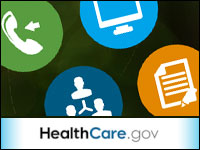
The troubled Healthcare.gov website seems to have found its sea legs at last.
After a botched rollout, the White House set itself a new deadline of Nov. 30 and hunkered down to repair the many glitches afflicting the site, through which Americans in the 36 states it serves must get their health insurance under the Affordable Care Act.
By and large, it appears to have succeeded, with some 29,000 people signing up for health insurance through the site on Sunday and Monday alone, according to sources cited by Reuters. That’s roughly the same number of people who signed up for the entire month of October.
Other data indicates that some 100,000 Americans signed up for health insurance during November, when the site was still running but undergoing repairs.
Whether these numbers can be deemed a victory or not much depends on one’s political orientation. Given that it’s the hallmark legislation of the Obama administration, Democrats desperately want it to succeed. Republicans are equally hopeful that it will fail.
By at least one measure, though, it appears the website has an uphill climb: The Congressional Budget Office has projected that 7 million people need to sign up for private insurance by March 31. Certainly more people will sign up by the Dec. 23 deadline to get health insurance by Jan. 1, 2014 — but it is an open question whether it will be enough.
A Major Turnaround
Fixing the site has been a tremendous achievement given the mess that first debuted, and the Obama administration is clearly hoping news of the turnaround will inspire more people to join.
“While we still have work to do, we have made significant progress with Healthcare.gov working for the vast majority of users,” Jeff Zients, who is leading the effort to repair Healthcare.gov, told reporters on a press call at the beginning of the week.
The site now works “in the zone of 80 percent” of users — up from just 30 percent of users who were able to navigate it in October, Zients said.
To get to that point, the administration had to make more than 400 software fixes and hardware upgrades, which doubled the site’s capacity, among other advances.
‘Greatly Improved’
The turnaround is telling, said Randall Ellis, a professor of economics at Boston University.
The site is now “greatly improved,” Ellis told TechNewsWorld. “It is now much easier to use and to navigate, with relatively few glitches.”
There was little media coverage of the significant improvement that happened in late October that enabled people to do some shopping in most of November — “particularly to get a list of available options in their county,” he explained. “It was a button on the home page, which did not require any security to view options.”
It was this option that made it easier for people to enroll in November and plan for their enrollment last month and this one, Ellis said.
Younger People Shunning the Site
Separate studies, though, are suggesting that the fix may be too late, and that the younger adults necessary for Affordable Care to succeed have no interest in participating.
In fact, it is unlikely that this trend will reverse itself, David Johnson, CEO of Strategic Vision, told TechNewsWorld.
“The negative publicity and poor branding have created a negative impression that continues to be reinforced,” Johnson said. “Very seldom do first opinions on a piece of legislation or brand change after the initial rollout.”
A Basic Need
Another school of thought, though, points out the obvious: People need to have health insurance — literally, since it is required by the law — and with the subsidies offered, the coverage is affordable for many people.
“The need for the uninsured to have insurance coverage will certainly outweigh the technical glitches encountered in healthcare.gov,” predicted Angela Mattie, an associate professor and chair of the Healthcare Management and Organizational Leadership Department at Quinnipiac University.
“While the Affordable Care Act falls short of completely reforming the health care system,” Mattie told TechNewsWorld, “it does expand coverage for those individuals who have previously been shut out of the insurance coverage market.”





















































The site still isn’t capable of processing payments. Tens of thousands of people, if not more, who think they have obtained health coverage are in for a rude awakening when they discover that applying for insurance does not equate with obtaining insurance. To cure that, the insurance companies likely will be advanced billions of taxpayer dollars based on their estimates as to what the coverage will cost. That equates to another government bailout that working Americans and future generations will flip the bill for.
Furthermore, computer and internet security experts have deemed healthcare.gov completely inadequate in terms of users’ sensitive data being protected. This is a success? Gimme a break.